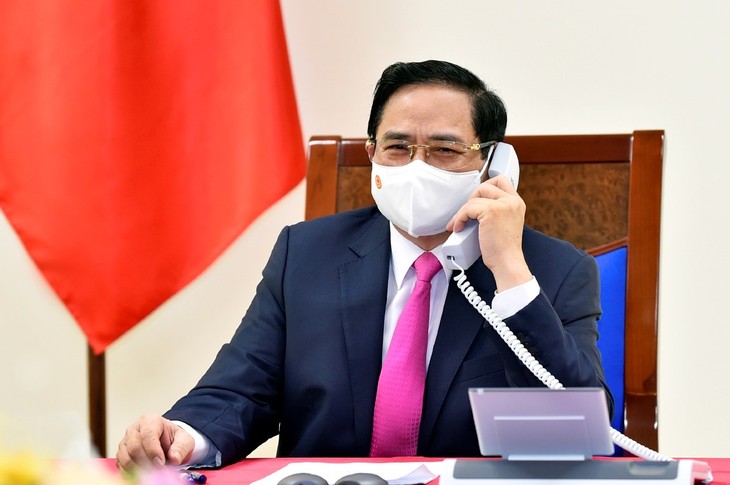PMs look to boost Vietnam-Japan partnership
(VOVWORLD) - Prime Minister Pham Minh Chinh and his Japanese counterpart Suga Yoshihide lauded the growing Vietnam-Japan ties and discussed ways to boost the two nations’ extensive strategic partnership during their phone talks on Monday.
 Prime Minister Pham Minh Chinh holds phone talks with his Japanese counterpart Suga Yoshihide on May 17, 2021. (Photo: VGP/Viet Bac). Prime Minister Pham Minh Chinh holds phone talks with his Japanese counterpart Suga Yoshihide on May 17, 2021. (Photo: VGP/Viet Bac).
|
PM Chinh suggested both sides focus on five cooperation areas. They include infrastructure development in transport, environment, and digital transformation, among others; access to supply sources of and technology transfer on vaccines against COVID-19; encouraging Japanese investment in Vietnam for supply chain diversification, support industry development, and innovation in association with technology transfer; and increasing the grant of scholarships and reception of Vietnamese interns to work in Japan.
PM Suga affirmed Japan’s consistent policy of attaching importance to relations with Vietnam, and pledged to continue support for Vietnam in infrastructure development, especially in the fields of transport, energy, environment, and space cooperation.
He underscored that Japan will offer Vietnam maximum support and collaboration to ensure that the nation has its necessary amount of COVID-19 vaccines.
According to PM Suga, in the process of promoting supply chain diversification, the waves of Japanese investment into Vietnam have increased sharply. Hoping Vietnam will improve its business climate, he expressed his willingness to assist the Southeast Asian nation in digital transformation and IT development. He also pledged to make efforts to soon receive Vietnamese trainees, and continue supporting Vietnam in training high-quality human resources.
The two PMs agreed to strengthen strategic dialogue between Vietnamese and Japanese ministries, sectors, and localities, and coordination to handle issues arising in the bilateral relations.
They also discussed regional and international issues of mutual concern, including the East Sea (known internationally as the South China Sea) issue. They agreed to continue working closely at multilateral forums, particularly at the United Nations and ASEAN.